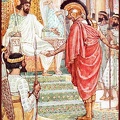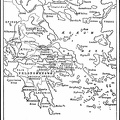In the Olympian temple, in later days, there was a marvellous statue of Zeus in gold and ivory, wrought by the genius of Pheidias, the greatest sculptor of Greece.
The games were open to all, and spectators as well as competitors flocked to Olympia from every state in Greece. To the Greeks these games were part of their religion; they were rites pleasing, so they believed, to the gods.
Should there be war between any of the Greek States at the time of the games, all hostile acts were forbidden in Olympia. Until the festival was over, those who had been in arms, one against another, might meet in safety and in peace. Twice or thrice an armed force made its way into the sacred territory of Elis to interfere with the games. This to the Greeks was sacrilege.
In the earliest times the games lasted only for one day, and a simple foot-race was the only event. But soon the festival came to last for five days, for there were now, not only foot-races, but wrestling, boxing, racing in armour, and above all else chariot races. In these races it was not the driver who, if successful, won the wreath of olive, but the owner of the chariot.
- Author
- The Story of Greece: Told to Boys and Girls
Author: Mary Macgregor
Illustrator: Walter Crane
Available from gutenberg.org - Posted on
- Friday 27 August 2021
- Dimensions
- 1815*2508
- Tags
- Place:Greece
- Albums
- Visits
- 803
- Downloads
- 37
 Download Photo
Download Photo





